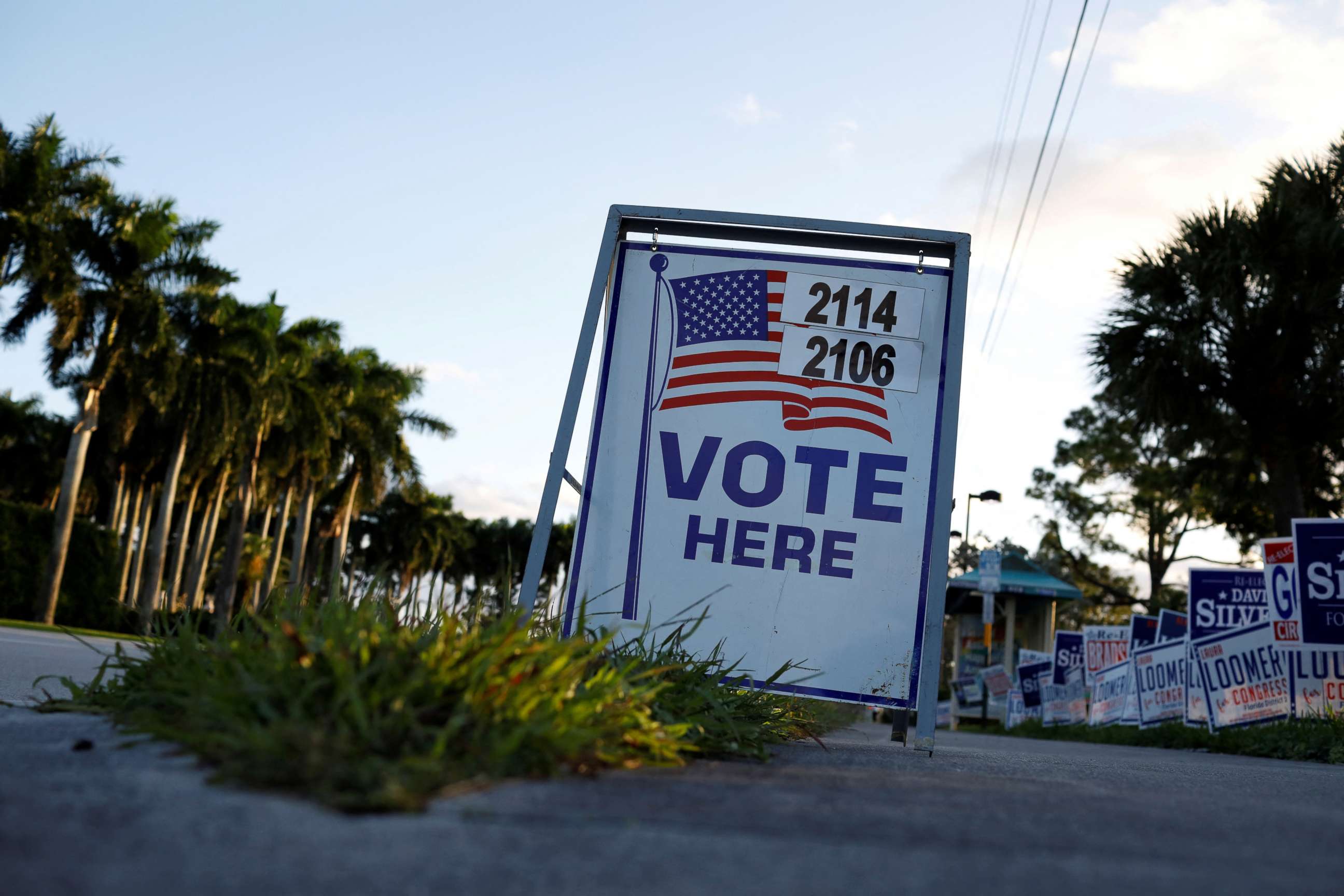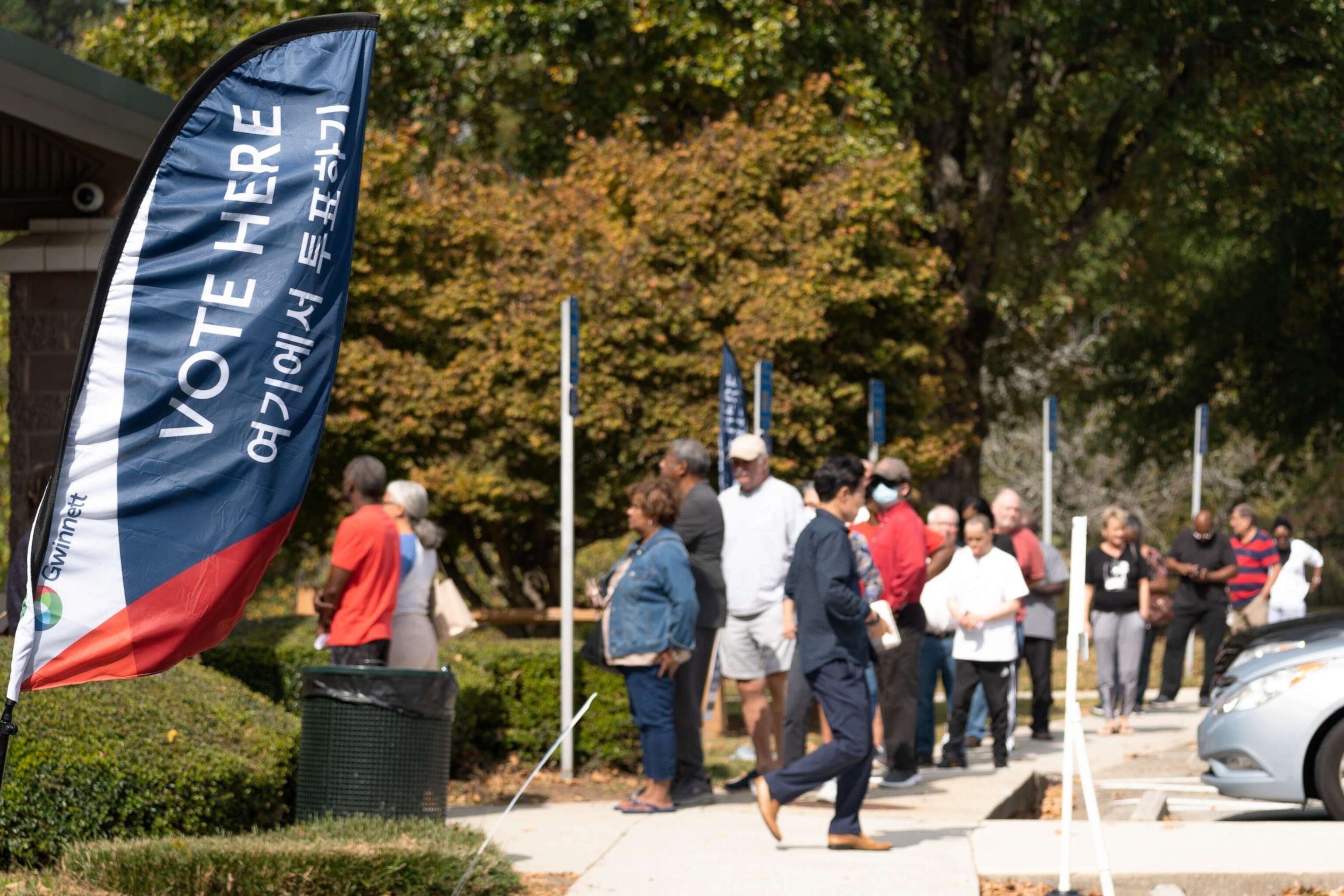Voters with literacy issues face challenges as midterm elections near
Start Here speaks with ProPublica's Annie Waldman about recent cases.
As the midterm elections near, election rights advocates have sounded the alarm about what they say are serious cases of voter intimidation and restrictions against voters who have trouble reading their ballot.
In some jurisdictions, election officials have scaled back the number of people and resources used to help those voters at polling stations read and properly cast their ballot.
ABC News' "Start Here" spoke with ProPublica's Annie Waldman, who's been covering the issue and talked about recent cases that have taken place, particularly in Southern states.

START HERE: When we talk about voter illiteracy, how big of an issue is that really? Are you telling me there are actually people out there who are voting [and] who can't read?
ANNIE WALDMAN: That's right. This is not a small group of people. According to the data for the National Center for Education Statistics, there are about 48 million Americans adults, about one-fifth of the adult population, who struggle to read at a basic level.
Adults born outside of this country are disproportionately represented, but about two-thirds of adults with low reading skills were born in the United States. So it's not just people who immigrated to our country who were struggling with English.
And this actually impacts their ability to vote. It impacts their ability to understand names on the ballot, impacts somebody's ability to understand registration dates and what's required and where to fill out forms. What is in place in our federal laws is that we are guaranteed that if we struggle to read, we can have somebody help us at the ballot box and help us vote.
But people aren't always aware that this is a federal right. That assistance is something that is protected by federal law.
START HERE: When we talk about like these sort of volunteers, what does that mean? They're at the polls on Election Day saying like, "Hey, I'll read your ballot to you if you want?"
WALDMAN: Yeah, that's right. There are people out there who [are] sitting an appropriate distance away from the actual ballot box. Um, but they are there to help you read if you struggle at the ballot box. Also, poll workers are sometimes allowed to help you read your ballot if you struggle.
There are a number of states which are making it even harder to provide assistance.
There [are] a number of states have actually made it harder for people to vote.
Over the past two years, because of the myth of election fraud, states have proposed new restrictions. While they don't all target voters who struggle to read, they do make it especially challenging. For example, Georgia passed a law last year limiting who can even return or even touch an absentee ballot.

Florida also expanded the radius around election locations in which volunteers are actually prohibited from asking people if they need help. And Texas passed a law which prohibits voter assistance. So people who are trying to help people who struggle to read from answering questions or paraphrasing complicated language on a ballot.
Even though a federal judge struck most of this law down, there's still remnants of it in place that really suppress people from trying to help others.
It's not just the laws themselves, but actually the prosecution of people who are trying to help people vote. We stumbled upon the story of Olivia Coley Pearson. She's a city commissioner in Coffee County in Georgia, and she's made it her mission to make sure that everybody in her community who wants to vote has an opportunity to do so. And she's been helping them for decades. But over the past 10 years or so, she's been prosecuted twice for trying to help people at the ballot box.
START HERE: She’s been prosecuted? What do you get prosecuted for?
WALDMAN: That's right. In 2012, the chair of her Board of Elections in her county where she lives filed a complaint against her and a handful of other volunteers, essentially accusing them of helping people who "didn't qualify for help." Georgia law only allows for voters to actually receive assistance if they are disabled or cannot read English.
And so the Secretary of State's office…they investigated Olivia to make sure that she was fairly helping people who actually needed help. They found that there were a number of voters who said that they couldn't read and did need help, but there were also voters who requested help regardless of their ability to read.
The actual Secretary of State's office state election board chose not to recommend her case for criminal prosecution, but the local district attorney prosecuted her anyway, charging her with two felonies. This trial ended up in a hung jury, and when it was moved to another county, she was acquitted of all charges.
The sad thing is her saga did not end there. In 2020, when she was helping voters who struggled to read at the polls, she was arrested at the voting booth for supposed criminal trespassing. The charge hung over her for two years, but just earlier this year, the case was dropped. So again, you hear about these laws that are getting stricter in all these states that really limit assistance, but then you hear the story of Miss Coley Pearson, and that's what brings intimidation and suppression to the forefront. That's what we're looking at.
START HERE: Is there a concern though because I understand that, like, people should be able to understand their ballot, should be able to make an informed choice. I'm just thinking of the worst-case scenario. Somebody shows up at your polling place, they say, "Hey, I want to help you out." You're like, "Thank goodness I need some help," and then they say, "Vote for this, here's the list of people," and they just leave out the name of the Republican, or the name of the Democrat, or something like that.
Isn't there a concern that if you got everyone going in the voting booth together, that you do end up getting bias and influence where there shouldn't be?
WALDMAN: That's an interesting point that you bring up. In fact, conservative politicians have been using that as a rationale to actually crack down on voter assistance.
START HERE: Trying to see all the angles here, yeah.
WALDMAN: You know, as, as we all know, widespread voter fraud is actually a myth. That doesn't happen. And there are many people who are put in place to watch people vote, to make sure that they're accurately voting, [and] that they're voting in the right way in the polling booth to make sure that nobody's going to overstep their bounds. So, the case of this happening, it would be extremely rare, if at all.
START HERE: In your reporting you noted that the majority of functionally illiterate adults in this country were born here…that there are sizable groups from all races…but that Black adults are overrepresented here. I mean is race an issue when we talk about how that affects voting?
WALDMAN:: Yeah, we can't forget the history of voting rights in the South and when we're talking about what's happening today. About 50 years ago, Southern states forced literacy tests on voters to keep Black people out of the polls.
And back then, local voting officials actually made exceptions for white people who couldn't read. It was really only in 1965 when Congress passed the Voting Rights Act prohibiting racial discrimination at the polls that some of this started to stop, but this did not stop White conservatives especially in the South from continuing to discriminate against voters, particularly those with low literacy skills who, due to centuries of oppression, were disproportionately Black.
In 1982, recognizing the importance of assistance at the polls, particularly for people of color, Congress amended the Voting Rights Act and affirmed that people are allowed to have assistance at the polls. But even though there was this kind of congressional affirmation of this in 1982, it wasn't enough to fully eradicate this kind of discrimination at the ballot box. We have reviewed lawsuits, and federal investigations, and we found numerous examples where the discrimination continues to this day.




